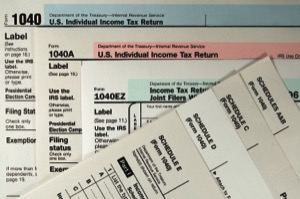
The first time I did taxes for Greg and Linda, I was blindsided. They were married the summer before they became my clients. Both of them had only ever received refunds on their tax returns. And this year, they owed money to Uncle Sam. A lot, too. I, like my new clients, hadn’t really internalized my understanding of how marriage really impacts people’s taxes. I was caught off guard, to say the least.
Fast-forward 10 years later to now, and we are on the verge of nationwide marriage equality. Over this time, it has been exciting to see the progress we as a community of LGBT people have made. It has also been challenging to inform LGBT people of their tax-related rights and responsibilities along the way.
A single person is a single person, and the tax code doesn’t care if you are LGBT or not. All single status filers follow the same set of rules and, in general, are accustomed to those rules so there are few surprises that are unique to LGBT people. One interesting area that is unique, however, is the tax treatment of medical expenses for transgender folks. In its 2010 case, O’Donnabhain v. Commissioner, the U.S. Tax Court ruled that hormone therapy, sex reassignment surgery and in some cases breast augmentation/deconstruction are, “legitimate and often medically necessary treatments for transgender people,” and are as such, deductible medical expenses.
And, whether single or not, fertility treatments that women undergo in order to have a baby may also be deductible as medical expenses. For those who adopt, there is also a tax credit of up to $13,190 per child for adoptions finalized in 2014.
When you add another person to the mix, the tax code gets a little trickier and sometimes downright unfair. As of the issuance of Revenue Ruling 2013-17, in response to Edith Windsor’s U.S. Supreme Court victory against the Defense of Marriage Act, the IRS expanded its definition of marriage for all federal tax purposes to include same-sex couples who were married in any affirming jurisdiction. So, two men who marry in California are married for federal tax purposes. Two women who marry in Iowa? Them, too. This status applies regardless of where these couples live. If they live in a marriage equality state, they use a married filing status (separate or joint) on both their federal and state returns. If they live in a non-affirming state, they file as married on their federal return and use a single status on their state return. Here in California, if two men or two women marry, then their taxes are exactly the same as mom and dad’s taxes, with all of the benefits and surprises of filing as married.
When the person you add to the mix is a registered domestic partner (RDP) or a civil union partner, then for federal purposes you are single. Revenue Ruling 2013-17 spells out clearly that RDPs are not spouses for federal income tax purposes. In California, however, RDP couples file taxes with a married status; joint or separate. So, for a California RDP couple, each person files a single-status federal return, and a married-status state return. And, to make life more interesting, as California is a community property state, California RDP couples who must file a single status on their federal return, must also properly allocate items of community property and income. For couples where one partner earns substantially more than the other, filing as RDPs can result in a pleasant surprise at tax time.
While I would never give a same-sex couple the advice to either marry or not marry based solely on the tax impact, I always advise them to ask questions and understand what marriage (or not) will mean for them.

So, what’s the big deal, then, as we move toward marriage equality, for same-sex couples who want to tie the knot? Won’t they continue to get refunds like they always have? Not necessarily. This is where the tax code gets ugly: the so-called “marriage penalty.” The marriage penalty also doesn’t care if you are LGBT or not. Here’s an example that might help clarify things:
For 2014, the 25 percent federal income tax bracket goes up to about $89,000 for a single person. Let’s say you and I get married. We each have $85,000 of taxable income per year. On a single return, we would each max out our taxes at 25 percent. If we marry, however, and regardless of whether or not we are LGBT and in a same-sex marriage, our 25 percent bracket tops out at $148,500. So, on about 22K worth of our joint earnings we are paying taxes at a higher rate. That’s one example of the marriage penalty.
At higher levels of income, there is the “Additional Medicare Tax” which is a tax to help fund the Affordable Care Act. For a single taxpayer, this tax of 0.9 percent will apply on earned income above $200,000 for the year. While you might expect a married couple to earn up to $400,000 before this tax kicks in, you would be incorrect. For a married couple, the tax applies to earned income above $250,000, definitely a marriage penalty.
In the case of Greg and Linda, the clients who were shocked when they owed taxes, their owing tax was a payroll withholding issue. If you and I marry and we each make $100,000, my payroll system does not calculate your wages when determining the amount of taxes to keep from each check. Similarly, your payroll system doesn’t know what I make each paycheck. Since the percentage of tax increases as income does, tax on $200,000 is more than double the tax on $100,000, so we won’t have had enough tax taken out of our checks.
The tax code is confusing at best. It’s no wonder that people who get married end up with surprises. But if you think about it, we have all grown up in a world without the assumption that we boys will meet Mr. Right, (or that we girls will meet Ms. Right), get married, and file taxes as a married couple. It’s still a brand new concept for us. The stuff that trips up our non-LGBT brothers and sisters is even less familiar territory to us. Imagine a transgender person asking, “Are my hormone treatments deductible?” when society still tells this person to hide. If somebody can’t come out, they won’t ask LGBT-specific tax questions.
It is quite important, then, to find a tax professional who is beyond just tolerant of your status as an LGBT individual. I’d suggest you ask about their experience over the last several years with same-sex married and RDP couples. I don’t believe you need a gay tax guy, for example, but I do think it’s very important that you feel comfortable discussing very intimate personal details with the person you choose.
We tax professionals often know more about our clients than most of their friends and family members. It’s important that you sense a high level of trust and respect for who you are as a person.












My lifetime partner of 53 years and I were married almost 11 years ago in Massachusetts and until last year, we could not file our taxes jointly. Since section 3 of DOMA was overturned in 2013, last year, 2014, our tax guy recommended that we file our taxes jointly as a married couple so we could save $3000. He also charged us only one fee for his work which was less that we paid when we were charged separately. We are very happy to be recognized as married American citizens after all of these years and we deeply appreciate our tax guy for his support.